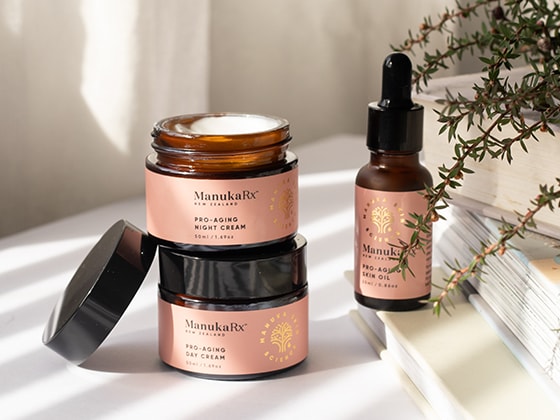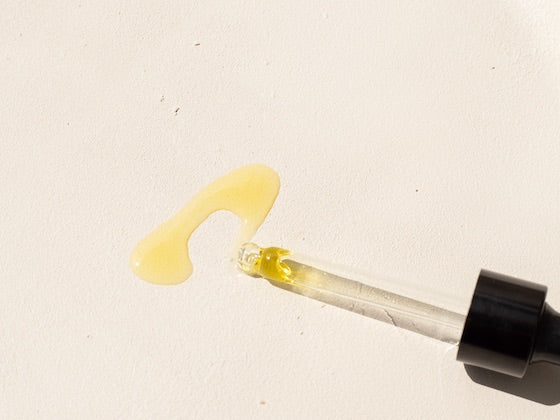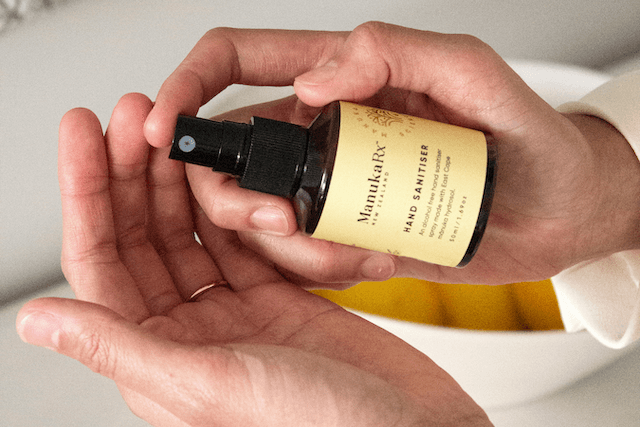If you live in New Zealand, you know about mānuka. And most people outside of New Zealand probably know a bit about mānuka honey, which introduced New Zealand’s mighty myrtle to the main stage for skincare. Yet, there is a relatively new and exponentially more powerful antibacterial byproduct of mānuka we need to get you up to speed with -- mānuka essential oil.

Though mānuka honey and mānuka essential oil both get their benefits from the mānuka plant, there are quite a few differences to the benefits and uses that you should know about and how mānuka essential oil is revolutionising natural skincare.
How Mānuka Honey is Made
You’ve probably already guessed, but mānuka honey is made from bees that feed on the nectar of the mānuka flowers, creating honey that is gathered by beekeepers across New Zealand.
Because of the many varieties of mānuka across New Zealand, the potency and benefits vary quite a bit depending on what mānuka plants the bees are buzzing around. That’s why they have the Unique Mānuka Factor (UMF) grading system. This helps to distinguish the quality and unique characteristics of that specific honey that relates to the uses.
How Mānuka Oil is Made
Mānuka essential oil production was only experimented with over the past few decades, but in that short period of time, the distillation process used has unlocked the infinite potential of this powerful plant.
We’ve gone into detail about how mānuka oil is made, but in brief, mānuka oil is made using a precise steam-distillation method with the raw material from mānuka leaves and branches. The mānuka plant is sustainably harvested in the wild or on mānuka plantations, making sure to take great care so that the plants continue to thrive.
After the mānuka branches are gathered, it is taken to a facility to be distilled. The slow, lower heat distillation method takes around 6 hours, but allows the precious oil produced to retain its unparalleled skincare properties. This is a process that is much more time consuming than other essential oils, but completely worth it!
What are the Benefits of Mānuka Honey?
Like many other honeys, mānuka honey is known to be great for wound healing and anti-inflammatory uses. Except, unlike other honey outside of New Zealand, it has the power of mānuka to add to this effectiveness.

Mānuka honey has antibiotic and antibacterial properties, with naturally produced hydrogen peroxide and phenolic compounds that help to promote wound healing, keep the skin hydrated, soothe burns, and protect skin during the healing process.
Specific mānuka honey products have also been used to help heal ulcers and even as a treatment in certain types of cancers.
What are the Benefits of Mānuka Oil?
Mānuka essential oil benefits for health and skin are still being discovered, but the list of benefits is continuing to grow and is already remarkable. Mānuka oil, specifically East Cape mānuka oil, is antibacterial, anti-fungal, antimicrobial, and anti-inflammatory.

Due to the powerful β-triketones found inside of East Cape mānuka, this essential oil has over 1,000x more antibacterial effectiveness than mānuka honey.
Yes, you read that right -- 1,000x more powerful than mānuka honey! And the benefits don’t stop there.
Because of the immense amount of antibacterial power inside, East Cape mānuka essential oil can kill off even the worst types of skin bacteria like staph, which is becoming one of the antimicrobial resistant superbugs around the world.
Given this type of mānuka oil is so effective, this makes the benefits for antibacterial skincare and other applications seemingly endless!
What are the Uses of Mānuka Honey?
As we mentioned before, mānuka honey is known for its incredible wound healing abilities and uses for burns. Besides a handful of topical uses, it’s great to add to tea when a cold comes creeping in or to apply onto an ulcer for relief and faster healing. And of course tastes phenomenal on toast!
Because of mānuka honey’s texture and stickiness (aka high viscosity), applications are quite limited outside of the ones listed above and make it difficult to add to many skincare products.
What are the Uses of Mānuka Essential Oil?
It’s mind-blowing what nature provides for us, and the plant-powered super essential oil derived from East Cape mānuka oil continues to surprise.
When used on its own, East Cape mānuka essential oil packs a punch against bacterias that cause havoc for our skin and health, helping to protect and fortify our largest organ. It can help tackle severe cases of acne, repair damaged and dry skin, promote skin cell regeneration with anti-aging benefits, fight fungal infections like athlete's foot, and more. And it’s even proving to have an important role to play against antimicrobial resistance. Mānuka essential oil is scientifically formulated to bring out the best in your skin so you can ditch those harsh chemical treatments and synthetic products for good!
East Cape mānuka essential oil is also a synergistic essential oil, meaning it can be paired with other ingredients and essential oils that have their own unique and powerful benefits, and even boosts the effectiveness of them. This makes East Cape mānuka oil one of the most powerful essential oils on the planet for skincare.






